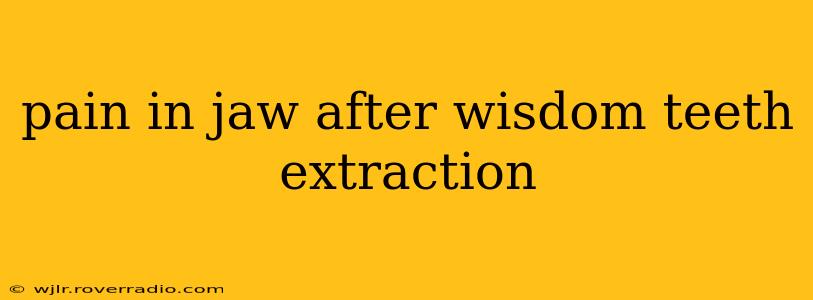Wisdom teeth extractions are common procedures, but post-operative jaw pain is a frequent concern. This comprehensive guide explores the causes, management, and prevention of jaw pain following wisdom teeth removal. We'll address common questions and provide valuable insights to help you navigate this recovery period comfortably.
What Causes Jaw Pain After Wisdom Teeth Extraction?
Jaw pain after wisdom teeth extraction stems from several factors:
-
Surgical Trauma: The extraction process itself involves incisions, bone removal (in some cases), and manipulation of tissues, leading to inflammation and pain. The severity depends on the complexity of the extraction. Impacted wisdom teeth, those that haven't fully erupted, often require more extensive surgery and result in more significant post-operative pain.
-
Inflammation and Swelling: Your body's natural inflammatory response to the surgery causes swelling in the jaw area, putting pressure on nerves and leading to pain. This is a normal part of the healing process, but can be quite uncomfortable.
-
Dry Socket: This painful complication occurs when the blood clot protecting the extraction site dislodges or dissolves prematurely. The exposed bone and nerve endings are extremely sensitive, causing intense, throbbing pain that often radiates to the jaw.
-
Referred Pain: Pain originating from the extraction site can sometimes be felt in other areas, such as the jaw, ear, or temple. This is because nerves in the area are interconnected.
-
Muscle Tension: Opening your mouth wide during the procedure and subsequent discomfort can lead to muscle tension in the jaw, exacerbating the pain.
-
Sinus Infection (if upper wisdom teeth were extracted): The roots of upper wisdom teeth are sometimes close to the sinuses. Extraction in this area can occasionally lead to a sinus infection, causing facial and jaw pain.
How Long Does Jaw Pain After Wisdom Teeth Extraction Last?
The duration of jaw pain varies considerably depending on individual factors and the complexity of the surgery. Generally, you should expect some level of discomfort for the first few days, with the most intense pain typically experienced during the first 24-48 hours. Most patients experience a significant reduction in pain within a week. However, some mild discomfort may linger for several weeks as the area continues to heal.
What Can I Do to Relieve Jaw Pain After Wisdom Teeth Extraction?
Managing post-operative jaw pain effectively is crucial for a smooth recovery. Here's what you can do:
-
Follow your dentist's instructions meticulously: This includes taking prescribed pain medication as directed.
-
Apply ice packs: Ice helps reduce swelling and numb the area. Apply ice packs for 15-20 minutes at a time, several times a day, during the first 24-48 hours.
-
Rest: Avoid strenuous activities and get plenty of rest. This allows your body to focus its energy on healing.
-
Eat soft foods: Avoid anything that requires excessive chewing. Soups, smoothies, yogurt, and applesauce are good options.
-
Rinse gently: Use a saltwater rinse (1/2 teaspoon salt in 8 ounces of warm water) to keep the extraction site clean and prevent infection. Avoid forceful rinsing.
-
Over-the-counter pain relievers: Ibuprofen or acetaminophen can help manage mild to moderate pain. Always follow the recommended dosage.
Is Jaw Pain After Wisdom Teeth Extraction Normal?
Yes, some degree of jaw pain is considered normal after wisdom teeth extraction. However, severe, persistent pain, or pain accompanied by other symptoms like high fever, excessive swelling, or difficulty breathing, should be reported to your dentist or oral surgeon immediately.
When Should I Call My Dentist or Oral Surgeon About Jaw Pain?
Contact your dentist or oral surgeon if:
- Your pain is severe and doesn't improve with prescribed medication.
- You experience excessive swelling that increases after the first few days.
- You have a high fever (over 101°F).
- You notice signs of infection, such as pus or foul odor from the extraction site.
- You have difficulty breathing or swallowing.
- You suspect a dry socket.
How Can I Prevent Jaw Pain After Wisdom Teeth Extraction?
While you can't entirely prevent jaw pain, following your dentist's instructions carefully and maintaining good oral hygiene before and after the procedure will significantly reduce your risk. This includes regular brushing and flossing, and following any pre-operative instructions regarding antibiotics or other medications.
This information is intended for general knowledge and informational purposes only, and does not constitute medical advice. It is essential to consult with a qualified dental professional for any concerns regarding your specific situation. Always seek professional medical advice for any questions you may have regarding a medical condition.
